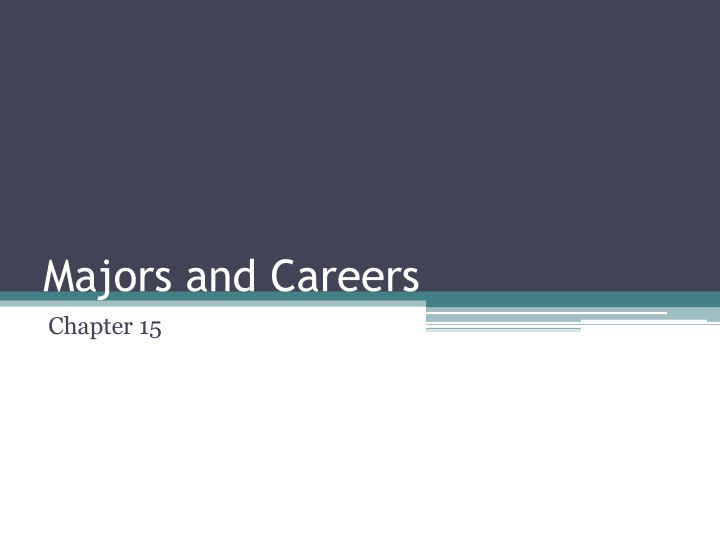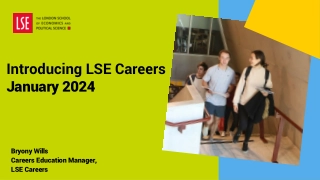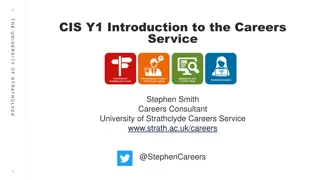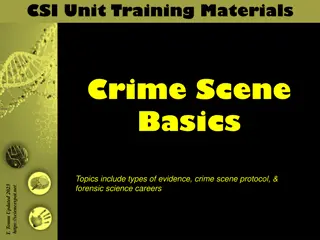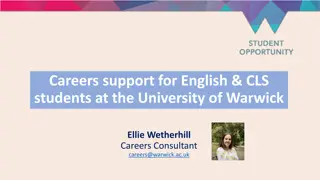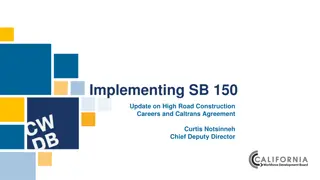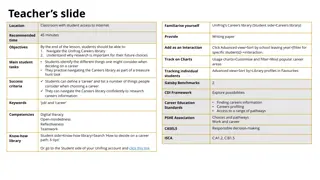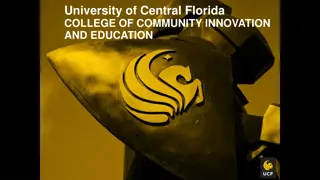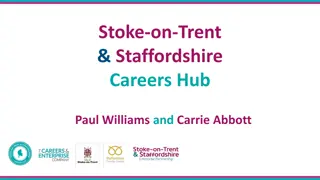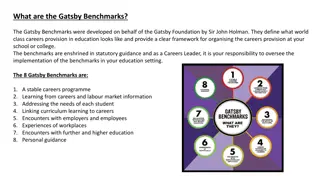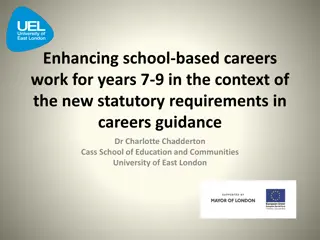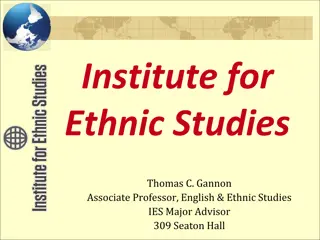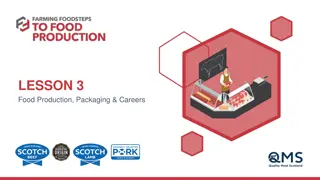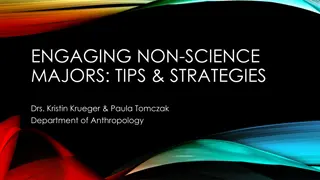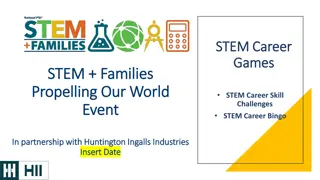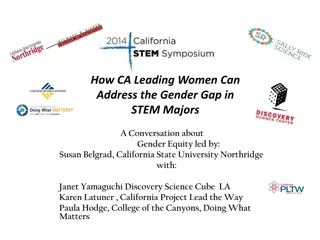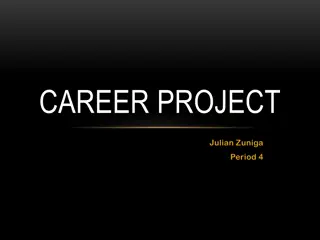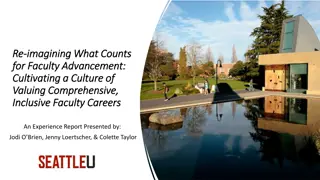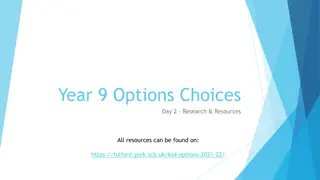Majors and Careers
Prepare for your future by making informed decisions about majors and careers based on self-assessment. Understand the demands of today's job market in the global, innovative, and ever-changing economy. Take responsibility for your career development, accept risks, and build a diverse portfolio of academic experiences. Work with academic advisers to select courses strategically and engage in self-exploration to align your values, skills, and interests with your career goals. Discover the importance of aptitudes and personality in shaping your career decisions.
Download Presentation

Please find below an Image/Link to download the presentation.
The content on the website is provided AS IS for your information and personal use only. It may not be sold, licensed, or shared on other websites without obtaining consent from the author.If you encounter any issues during the download, it is possible that the publisher has removed the file from their server.
You are allowed to download the files provided on this website for personal or commercial use, subject to the condition that they are used lawfully. All files are the property of their respective owners.
The content on the website is provided AS IS for your information and personal use only. It may not be sold, licensed, or shared on other websites without obtaining consent from the author.
E N D
Presentation Transcript
Majors and Careers Chapter 15
Careers and the New Economy Base your decisions about major and career path on: Information about yourself Long-term demands of the job market Characteristics of today s economy Global Unstable Innovative Without boundaries Customized Ever-changing Social
Careers and the New Economy (continued) Building the right mind-set for the future A degree does not guarantee employment You are responsible for your career To advance, accept risks A first career choice may not be permanent Start now to build a portfolio of academic and co-curricular experiences
Working with an Academic Adviser Prepare for your first meeting Follow these rules on selecting courses: Most take four to six courses a term Know days and times classes meet and make sure they don t overlap Register as early as possible Do not cram all of your classes into one or two days Go for a mix of hard and easy classes
Self-Exploration in Career Planning Self-assessment Process of gathering information about yourself in order to make informed decisions Factors that can affect career goals: Values Skills Aptitudes Personality Life goals and work satisfaction Interests
Self-Exploration in Career Planning (continued) Values Things you most desire in a career, in relation to how you want to live A career choice related to your core values is likely to be the best choice Skills Personal Workplace Transferable
Self-Exploration in Career Planning (continued) Aptitudes Acquired or natural ability for learning Proficiency in a particular area Personality Makes you who you are Don t ignore when you make career decisions Myers-Briggs Type Indicator assessment Make decisions Perceive the world Interact with others
Self-Exploration in Career Planning (continued) Life goals and work values Two factors can change how we feel about our success and happiness: Achieving the life goals we ve set for ourselves Gaining satisfaction from our work Interests Good career exploration begins with considering what you like to do and relating that to your career choices
Exploring Your Interests Try a major you think you ll like and that makes sense given your identity John Holland Developed a model that organizes career fields into six general categories Career fields are grouped according to what is required and what rewards are provided
Hollands Hexagonal Model of Career Fields
Being Career-Minded in College Visit the career center yearly Explore the career center Web site Attend your college s career fairs Take a variety of classes and watch grades Network Discover leadership opportunities Build communication skills Develop computer skills Create and monitor your digital footprint
Tech Tip: Join the Professional Community To research a professional community that you re interested in joining: Conduct industry and career research Do some research on yourself Get familiar with professional organizations Find ways to gain real experience Check with your college s career center about internships
Getting Experience Experiential learning Meet people who may later serve as important employment references Ways to pursue: Volunteer Service-learning Study abroad Internships and co-ops Student projects and competitions Research
Getting Experience (continued) Working in college Gain professional experience Earn money for tuition, books, and living expenses Network/make connections Learn more about yourself and others Develop key skills, such as communication, teamwork, problem solving, work ethics, and time management
Getting Experience (continued) On-campus employment Work schedules are often flexible Connect with people who may later consult as mentors or professional references Students who work on campus are more likely to graduate Some jobs are reserved for work-study students Off-campus employment May pay better May be more convenient May be in an organization where you want to continue working
Job-Search Strategies Learn the names of the major employers in your college s geographic area Check the Web site of the state agency that provides information about employment opportunities Visit employment agencies Visit online job boards and look at the classified ads in the local and student newspapers Be aware that many jobs are never posted Realize that who you know is important
Job-Search Strategies (continued) Market yourself If you don t do it, no one else will Actions speak louder than words Got ideas? Share them Get an edge over your competition It isn t all about you
Job-Search Strategies (continued) Build a r sum Choose between the chronological or skills-based formats Employers spend 7 to 10 seconds screening each r sum Single page is usually appropriate Write a cover letter Address to a specific individual Proofread carefully Explain how hiring you will benefit the organization
Job-Search Strategies (continued) Interview preparation Start with the organization s or company s Web site Review competitors Web sites Ask for advice Use your library Note the employer s goals and values Research the company s products and services Find out the company s strategic goals, special projects, and new developments Take your research with you to the interview
Job-Search Strategies (continued) Practice interviewing Participate in a mock interview Many career centers have virtual practice interview software for you to gain experience Appropriate interview conduct Dress appropriately Arrive to the interview on time Follow up
Skills Employers Seek Content skills Intellectual or hard skills Acquired as you gain mastery in your field Transferable skills Skills that apply or transfer to a variety of settings Communication skills, presentation skills, leadership skills, team skills, interpersonal skills, personal traits, critical thinking and problem solving
